As a successful dental practice owner who prides themselves on their accomplishments and making wise investments, you may now find yourself in the market for a reputable, luxury electric vehicle. It’s time to say goodbye to your gas-guzzler and hello to a new eco-friendly option that features high-tech and impressive performances. While a luxury electric car is a significant investment, it’s a smart long-term investment.
As a dental practice owner in Canada, there are numerous benefits associated with purchasing a luxury electric vehicle, ranging from environmental considerations to financial incentives and brand image enhancements.
Table of Contents
ToggleKey Advantages of Purchasing a Luxury Electric Vehicle
Environmental Friendliness
With the growing concern over climate change and air pollution, owning an electric vehicle can help reduce your carbon footprint. By choosing an electric vehicle, you are making a positive contribution to the environment by reducing greenhouse gas emissions and helping to preserve our planet for future generations.
Brand Image & Reputation
Owning a luxury electric vehicle can help enhance your company’s brand image and reputation. By embracing sustainable transportation options, you can showcase your commitment to corporate social responsibility and environmental stewardship. This can attract customers who value environmentally conscious businesses and help differentiate your company from competitors.
Cost Savings
While luxury electric vehicles may have a higher upfront cost compared to their gasoline counterparts, they tend to have lower operating and maintenance costs in the long run. Electric vehicles require less maintenance and have lower fuel costs, especially in countries like Canada where electricity is relatively cheap and abundant.
Tax Incentives & Rebates
There are rebates available to individuals that purchase electric vehicles. These incentives can help offset the higher upfront cost of luxury electric vehicles and make them more affordable for business owners. For example, in Ontario, there is a rebate of up to $5,000 for purchasing an electric vehicle. Rebate amounts and eligibility will depend on which province you live in.

Have You Heard About The Select Luxury Items Tax Act?
As of September 1, 2022, a new Select Luxury Items Tax Act was introduced by the Canadian government. The luxury tax will apply to vehicles that are priced or valued at or above $100,000. Examples (as stated on the Government of Canada website) include sedans, coupes, hatchbacks, convertibles, sport utility vehicles and light‑duty pickup trucks. While it will depend on what triggered the luxury tax on the subject vehicle, generally, the luxury tax is calculated as the lesser of:
- The taxable amount multiplied by 10%
- The amount that results from subtracting $100,000 from the taxable amount and multiplying the difference by 20%
This does not include PST, GST, HST or QST. You will have to pay the luxury tax when you take possession of or gain ownership of the vehicle.
The Incentives for Zero-Emission Vehicles (iZEV) Program
The Incentives for Zero-Emission Vehicles (iZEV) Program in Canada is a government initiative aimed at promoting the adoption of electric and other zero-emission vehicles. Launched in 2019, the program offers a variety of financial incentives to encourage consumers to choose environmentally-friendly vehicles over traditional gasoline-powered cars. It is slated to run until March 31, 2025. Changes were made to eligibility criteria that are now in effect as of October 1, 2024.
One of the key incentives offered under the iZEV program is a rebate on the purchase or lease of eligible zero-emission vehicles. The amount of the rebate varies depending on the type of vehicle and its battery capacity, with higher rebates available for vehicles with longer ranges. For example, a fully electric vehicle with a range of over 300 km can receive up to $5,000 in rebates, while a plug-in hybrid with a shorter range may be eligible for up to $2,500. The iZEV program also includes incentives for businesses and government organizations to invest in electric vehicles. These incentives can help offset the higher initial costs of purchasing electric vehicles compared to traditional gasoline-powered vehicles, making it more attractive for organizations to transition to a more sustainable fleet.
The iZEV program includes funding for the installation of electric vehicle charging infrastructure across the country. This investment in charging stations helps to address one of the key barriers to widespread adoption of electric vehicles – the lack of convenient and accessible charging options. By increasing the availability of charging stations, the iZEV program aims to make it easier for Canadians to make the switch to electric vehicles.

Changes as of October 1, 2024
As stated on the Government of Canada website, as of October 1, 2024, only zero-emission vehicles that are made in Canada or in countries with which Canada has a free-trade agreement, may be eligible under the Incentives for Zero-Emission Vehicles Program and the Incentives for Medium- and Heavy-Duty Zero-Emission Vehicles Program.
You Do Not Need to Apply
You’ll automatically receive a rebate at the time of sale by the dealership and it will appear on your sale or lease agreement, therefore, you do not need to apply.
Work with the Experts at Dental Tax
The iZEV program in Canada provides a comprehensive package of incentives to support the adoption of zero-emission vehicles and contribute to the country’s efforts to reduce greenhouse gas emissions and combat climate change. By making electric vehicles more affordable and convenient to use, the program is helping to accelerate the transition towards a more sustainable and environmentally-friendly transportation system.
To save money further, if you are purchasing a luxury electric vehicle as a sole proprietor, there are specific rules and guidelines set by the Canada Revenue Agency. You can only claim expenses for the portion of the vehicle’s use that is related to your business activities. If you use the car for both personal and business purposes, only the business-related portion can be deducted such as fuel and oil, maintenance and repairs, insurance premiums, etc. Ensure to retain all necessary records.
If you are a dentist wondering if purchasing a luxury electric vehicle is a smart investment, consider working with an expert who can guide you through the complexities of luxury taxes and government rebates to make the most of your money, especially if the luxury vehicle is over $100,000.
Adam has an MBA from the Richard Ivey School of Business in London and also holds a Chartered Investment Manager designation.
- Tax Return Preparation Guide for Dental Professionals - January 19, 2026
- Financial Lessons from Successful Dental Practices - January 12, 2026
- 2026 Tax Changes Affecting Canadian Dentists - January 5, 2026




